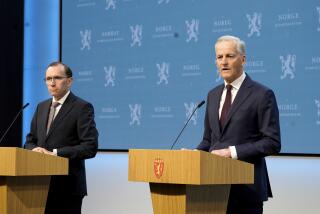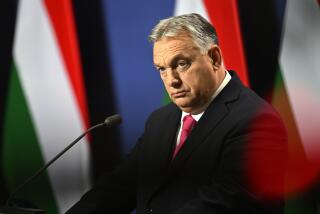Gorbachev Poised to Recognize the Baltics : Independence: The Kremlin says he will soon sign a decree revoking Soviet annexation of the three states.
- Share via
MOSCOW — Soviet President Mikhail S. Gorbachev is ready to sign a decree at the end of this week that will recognize the independence of the Baltic states of Estonia, Latvia and Lithuania, the Kremlin told Baltic officials Wednesday.
The presidential decree, as provided to Baltic officials, would declare invalid the Soviet Union’s annexation of the three states in 1940 under a pact with Nazi Germany; its legal effect would be to restore their independence.
“It will be, but when, I don’t know,” Alexander N. Yakovlev, a close Gorbachev associate, told reporters, confirming the Kremlin plan. The president has already agreed to the basic draft, Yakovlev said, as have the leaders of the other constituent republics.
Through the day, Yakovlev huddled with Baltic observers at the Congress of People’s Deputies, rewording the drafts of the decrees and working out the timetable for their proclamation.
Algimantas Cekuolis, a former Lithuanian deputy at the Congress who is attending the present session as an observer, said that Baltic representatives had met earlier with Gorbachev and drafted an independence declaration at his request. After reading it, Gorbachev had approved the approach, Cekuolis said, and ordered the decree drafted as the best way to cut through the politically difficult issue of the Baltic republics’ secession.
“I believe signing a decree is the only way possible now,” Latvian President Anatolijs V. Gorbunovs said in Riga. “Those constitutional ways offered previously would not work today and to issue a decree . . . would be the only possible solution for Mr. Gorbachev, saving his honor.”
But the wording of the decrees is still under negotiation, according to Baltic officials, and the timing depends on developments at the current session of the Congress of Deputies.
An early draft circulating in the Lithuanian capital of Vilnius would declare only that the Soviet Union would “consider as renewed the state of independence of these countries.”
“That’s not really enough after 51 years,” Cekuolis commented. “We would like, at least, a clearer admission that we were occupied illegally.”
Cekuolis said that the draft would annul the 1940 Soviet annexation of the Baltics, while leaving them with Soviet troops stationed on their territory, as they were at the beginning of World War II.
The Lithuanians are pressing, as are the Latvians, for a formal Soviet acknowledgment in the decree that the Soviet Union acted illegally in annexing the three republics, which were all members of the League of Nations at the time.
The Lithuanians also want to keep regions they gained under Soviet rule that were formerly part of neighboring Poland and Soviet Byelorussia, including the capital Vilnius, rather than revert to their 1939 borders.
The decree would take effect when the parliaments of the three republics accept its terms and ratify the European Convention on Human Rights. The Soviet Union would then establish diplomatic relations with each.
Gorbachev is expected to sign the decree after the current emergency session of the Congress of People’s Deputies. Originally, the Congress was expected to take up the issue, but its resurgent conservatives made approval by the required two-thirds majority unlikely.
Speaking to the Congress this week, Gorbachev said: “This is not the issue to be resolved by the Congress. If we had to resolve only the Baltic issue, it would not have been necessary to convene the Congress; there are other possibilities for this.”
To avoid the charge that he “lost” the Baltic republics, Gorbachev may issue the decree jointly with the State Council, which would be established by changes now before the Congress.
After the abortive coup d’etat last month, Gorbachev relented in his demand that the Baltic states follow the long, complex process laid down in a 1989 law for secession, and he affirmed his acceptance of Baltic independence on Sunday but gave no timetable.
On Monday, the United States recognized Baltic independence, a move that effectively sealed the Baltics’ break from the Soviet Union. The United States, Britain, France and many other Western countries had never accepted their forced incorporation into the Soviet Union under the dictator Josef Stalin, and continued to recognize their right to independence.
But the West had delayed recognition of the new nationalist governments in the three states and their recent reassertions of independence because of Gorbachev’s insistence that they follow Soviet procedures for secession.
Decree for Baltics
Soviet President Mikhail S. Gorbachev is preparing a decree to recognize the independence of Lithuania, Latvia and Estonia. Potential elements are:
* It would declare invalid the Soviet Union’s annexation of the three states in 1940 under a pact with Nazi Germany.
* Soviet Foreign Minister Boris N. Pankin would “restore diplomatic relations with the three republics.”
* Lithuanians and Latvians seek formal acknowledgement that the Soviet Union acted illegally in annexing the three republics, which belonged to the League of Nations.
* Lithuanians want to hold onto regions they gained under Soviet rule rather than revert to their 1939 borders.
More to Read
Sign up for Essential California
The most important California stories and recommendations in your inbox every morning.
You may occasionally receive promotional content from the Los Angeles Times.












